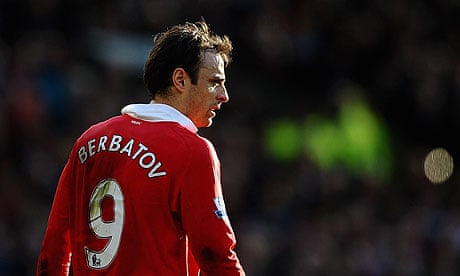By now, we are getting used to the smile, the index fingers pointing to the sky, the sense of potential blossoming into something far more serious and rewarding. It was there again when Mexico beat Paraguay in the Oakland Coliseum last weekend: a stooping header, a right-foot finish, two more goals and the adulation of the crowd. Then on to San Diego for a friendly against Venezuela and this time Javier Hernández was unable to score. It felt like the news itself. "Hernández could not find the back of the net," read one match report. All that was missing was the exclamation mark.
Back in Manchester, Dimitar Berbatov was quietly going about his business, the daily grind of training, preparing for Saturday's game at West Ham, quite possibly wondering whether he is being ushered to the edges in a season that at one point had cast him in the leading role.
Hernández has played instead of Berbatov in five of Manchester United's past six matches and Sir Alex Ferguson is now talking about the Mexican finishing the season with 25 goals, which does not sound like a man who is planning to use him sparingly over the next two months. So far, Hernández has 16 goals in 34 games (18 starts). In the Premier League he has 10 from 14 shots on target. For Mexico, 14 in 23 caps. Ask Ferguson about the player's development and he will glow with a rare pride. "It's been nothing but acceleration," he said this week of a 22-year-old who, at £6m, has legitimate credentials to be considered the season's outstanding piece of transfer business.
For Berbatov, it represents a challenging period in what we know can occasionally be an insecure and complex state of mind. The Bulgarian could conceivably return to the team at Upton Park this weekend but, if so, two things will have to be taken into account. One is that Hernández is simply being rested after a hectic fortnight of travelling through different time zones. The second is that there is hard evidence to deduce a clear change in Ferguson's thinking and that Berbatov has dropped to third in the list of United strikers when earlier in the season he had established himself ahead of Wayne Rooney as No1.
On the face of it, Berbatov is entitled to wonder what he has done wrong, maybe feel a little perplexed, aggrieved even, given that his partnership with Rooney has a better strike rate (a goal every 52 minutes) than Rooney's with Hernández (one every 71 minutes). This has been Berbatov's most productive season for the club by some distance, with 21 goals so far compared to 12 and 14 in the previous two years. He has more league goals than Didier Drogba and Fernando Torres together. He is the first United player to score a hat-trick against Liverpool since 1946 and the first to manage three hat-tricks in a single season since Ruud van Nistelrooy in 2002-03.
Rooney was asked this week to nominate United's player of the year and instinctively replied: "Berba." Yet there remains the unmistakable sense that Ferguson does not trust him implicitly and that Berbatov's position as the league's leading scorer is slightly deceptive when considering his overall contribution.
This is not to denigrate Berbatov's improvement from the man whose talent was too often muzzled in his sometimes beguiling, sometimes bewildering first two seasons at Old Trafford, but this is still a player who can perplex. Eleven of Berbatov's goals have come in three matches. In between the three against Liverpool in September and the five against Blackburn Rovers in November it sums up the Berbatov enigma there was a 69-day run when he did not score in 10 games.
Ferguson has described him as a "genius" this season but he has also publicly expressed dissatisfaction with the disparity between the player's performances home and away. All but four of Berbatov's 20 league goals have been scored at Old Trafford, and a direct correlation can be made with the team's results. The home record is formidable, with a mere two points dropped all season, whereas United have won only four away games.
His manager can sympathise with the player over his being left out – "It's not been easy, I can tell you," Ferguson says – but the problem for Berbatov is that a trend has developed and it is this: when the heat of the battle is dangerously close to intolerable, Ferguson tends to look elsewhere. Berbatov was not in the team against Chelsea. Nor the league and cup games against Arsenal. He was on the bench when Manchester City came to Old Trafford. Indeed, Berbatov has started only 23 out of 48 "big" games since joining the club – "big" meaning finals and semi-finals, league matches against Arsenal, Chelsea, Liverpool, Tottenham Hotspur and City, plus the Club World Cup and Champions League knockout ties.
Then consider the 30-year-old's record in Europe, 18 games and two and a half years since he last scored. Even Bébé and Gabriel Obertan have a fresher recollection of how it feels to score in the Champions League. Somewhere along the line Ferguson appears to have lost a degree of trust in the £30.75m man. In last season's quarter-final against Bayern Munich, with Rooney off the pitch and United needing a goal to stay in the competition, Ferguson preferred to use a winger, Nani, in the centre-forward's role, while the most expensive player in the club's history sat on the bench.
An argument could be made, of course, that there is a big difference between the Berbatov of now and then, particularly when thinking back to the almost broken body-language – shoulders sagged, head down, hands on hips – in the 0-0 draw at Ewood Park last April that can be identified as Exhibit A in the reasons United lost the league.
Berbatov's sympathisers can also point out that, unlike Hernández, his value to the team should not be gauged solely on goals. In football, a pass can be every bit as beautiful as a 30-yard shot, and Berbatov has always taken as much joy from playing the killer ball and, using the description Ferguson once gave Eric Cantona, being the modern-day "can-opener".
Not too much should be read into the fact United are yet to extend a contract that expires in 14 months. The club have a "one-way option" – a clause they often insert when signing players for large transfer fees, dating back to Juan Sebastián Verón – to add another year and there is no reason to believe it will not happen.
Nonetheless, Hernández's emergence is threatening to have ramifications for Berbatov if we can safely assume that Rooney, perhaps fortuitously, is to remain a mandatory first-team pick. Gary Neville likened Hernández this week to Ole Gunnar Solskjaer but it was not only the players' attributes in the penalty area to which he was referring. Neville noted how Hernández always chases down the opposition goalkeeper and defenders when he does not have the ball. "When you get a player who is willing to work like that, it lifts the whole stadium."
Ferguson has also used the Solskjaer comparison – there are not too many greater compliments for a striker at Old Trafford – and the manager's eyes sparkled this week when he recollected Hernández's scoring debut against an MLS All-Star side in Houston last summer. After the game Paul Scholes turned to Ferguson, nodded knowingly and registered his approval with one simple sentence: "He'll get us 25 goals." As Ferguson says: "Paul Scholes doesn't say a lot, but he's a fantastic judge."

